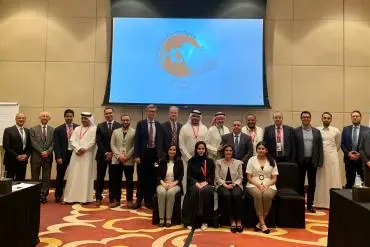PHOTO
Dubai, UAE: To support the World Health Organization’s targets of eliminating the hepatitis C virus (HCV) by 2030, as well as the efforts by the United Arab Emirates (UAE) Ministry of Health and Prevention (MOHAP), regional health authorities and the Emirates Gastroenterology and Hepatology Society to achieve this goal, Gilead Sciences Middle East stresses the importance of micro-elimination.
An effective concept in the fight against HCV, micro-elimination is a strategy that pursues national elimination by targeting one population segment at a time through multi-stakeholder initiatives. By tailoring interventions to the needs of these populations, elimination efforts are made simpler, more achievable and less-costly than full-scale, country level initiatives[1]. Presently, global efforts to eliminate HCV are picking up, with micro-elimination strategies proving very effective for the hardest to treat patients[2].
“Micro-elimination is the most realistic way to achieve elimination goals while being able to allocate appropriate resources and provide support to local medical professionals who can tailor interventions to suit the need of a particular segment. Through micro-elimination, we can target the most at risk populations such as those people who inject drugs, people who are incarcerated, patients who frequently receive blood transfusions or regions with relatively higher HCV prevalence, amongst others, and work in a more strategic manner to make a difference,” commented Mr. Cary James, CEO of the World Hepatitis Alliance, London U.K.
In 2016, the World Health Assembly endorsed the Global Health Sector Strategy (GHSS) on viral hepatitis, calling for the elimination of HCV as a public health threat by 2030. The strategy aims to reduce new infections by 90% and mortality by 65%[3]. 71 million people are infected with HCV worldwide with over 21% of them (15 million) in the Middle East region – this is the highest prevalence of the infection globally.
“The prevalence rate in the UAE is between 0.24% to 1.64%[4], and there have been several initiatives driven by the government in collaboration with the private sector to make strides towards early detection, treatment and the prevention of the virus,” commented by Dr Samir Alawadi, President of the Emirates Gastroenterology and Hepatology society.
“While prevalence rates in the UAE are low, multi-stakeholder collaboration between governments, primary care providers, other healthcare specialists, policy makers and pharma companies is key to achieving the WHO HCV elimination targets. While efforts so far have proven to be successful, simplifying the approach by creating a strategic plan to break down national elimination goals into smaller achievable goals for individual populations and working collaboratively will really support to maintain momentum of elimination efforts,” added Dr Maryam Alkhatry, Head of Gastroenterology & Hepatology Department, Ibrahim Bin Hamad Obaidulla Hospital , Ras al-Khaimah. Where is micro elimination of HCV initiated in RAK by Ministry of Health and Prevention
Gilead Sciences hosted a Middle East Micro-Elimination Workshop to discuss the proposed approach towards the elimination of HCV in the UAE and other countries in the GCC countries. Leading primary care medical professionals were educated on the principles of micro-elimination and the benefits of the simplification of HCV treatment as well as next milestones for each country.
Gilead Sciences is driven by a mission to eliminate all risks to public health. Through its medical education programs, local, regional and international medical professionals and experts are armed with the tools needed to tackle any issue in the future.
Ends-
Key speakers at the event included Dr. Stefan Wiktor, Professor in the Department of Global Health at the University of Washington, Seattle U.S.
Mr. Cary James, CEO of the World Hepatitis Alliance, London U.K.
Dr. Tarik Asselah, Professor of Medicine and Hepatology at Hôpital Beaujon, Clichy, and University Paris Diderot, France.
Dr. Manal Elsayed, Professor of Pediatrics at Ain Shams University, Cairo, Egypt.
About Gilead Sciences
Gilead Sciences is a biopharmaceutical company that discovers, develops and commercializes innovative therapeutics in areas of unmet medical need. The company’s mission is to advance the care of patients suffering from life-threatening diseases. Gilead has operations in more than 35 countries worldwide, with headquarters in Foster City, California.
For all media inquiries, please contact:
Ayman El Sayes
ayman.elsayes@gilead.com
T: +971 4 5564317
M: +971 55 9086566
For More information about Gilead & its products, please contact:
askGileadME@gilead.com
Disclaimer: The contents of this press release was provided from an external third party provider. This website is not responsible for, and does not control, such external content. This content is provided on an “as is” and “as available” basis and has not been edited in any way. Neither this website nor our affiliates guarantee the accuracy of or endorse the views or opinions expressed in this press release.
The press release is provided for informational purposes only. The content does not provide tax, legal or investment advice or opinion regarding the suitability, value or profitability of any particular security, portfolio or investment strategy. Neither this website nor our affiliates shall be liable for any errors or inaccuracies in the content, or for any actions taken by you in reliance thereon. You expressly agree that your use of the information within this article is at your sole risk.
To the fullest extent permitted by applicable law, this website, its parent company, its subsidiaries, its affiliates and the respective shareholders, directors, officers, employees, agents, advertisers, content providers and licensors will not be liable (jointly or severally) to you for any direct, indirect, consequential, special, incidental, punitive or exemplary damages, including without limitation, lost profits, lost savings and lost revenues, whether in negligence, tort, contract or any other theory of liability, even if the parties have been advised of the possibility or could have foreseen any such damages.




















